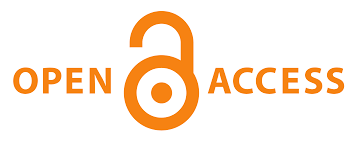The Role of Quipper Application for English Language Teaching
Main Article Content
Basidin Mizal
Tathahira Tathahira
Quipper is one of widely recognised Online Learning Platforms for learners on many levels. Quipper is equipped with several features that can support the process of learning, especially for language learning. This study aims to deeply discuss the features offered by Quipper that can benefit the learners through suitable instructional design used in learning English; and to provide the implication of its use for Indonesian education context. This study is library research where the data were derived from relevant articles and previous studies. The research findings revealed that some features of Quipper could benefit students to acquire new vocabulary, punctuality and grammatical awareness through Chat Room or In-built Messaging. Moreover, as web-based learning platform, Quipper could expose the multimodal exposure (written, oral and visual) for foreign language input. More importantly, Quipper was interestingly viewed by many learners as a new way of learning that somehow could enhance their positive language learning intensity. Nevertheless, even though Quipper is positively welcomed, it might imply several challenges and limitations. In Indonesian education context, Quipper could not be fully used as the main platform for learning because there would be a great reliance on teachers to misuse the features that leading to the boring class activity and lack of teaching professionalism.
Agustina, E., & Cahyono, B. Y. (2017) Perceptions of Indonesian teachers and students on the use of quipper school as an online platform for extended EFL learning. Journal of Language Teaching and Research, 8(4), 794-800. doi: http://dx.doi.org/10.17507/jltr.0804.20
Banados, E. (2006). A blended-learning pedagogical model for teaching and learning EFL successfully through an online interactive multimedia environment. CALICO Journal 23(3), 533-550.
Bang, S., Kanokkarnkittichartchaowalit., & Saekhow, J. (2016, November). Effects of quipper school program based on local contentsin surat thani province to enhance English listening skill of matthayomsuka v students. Paper presented at the Proceeding of ISER 42th International Conference, Tokyo, Japan.
Boyle, J. R., & Rivera, T. Z. (2012). Note-taking techniques for students with disabilities a systematic review of the research. Learning Disability Quarterly, 35, 131–143. doi:10.1177/0731948711435794
Campos, E. P. (2016, February 1). Quipper school: E-learning system to enhance education. Business Mirror; Makati City. Retrieved from: https://search.proquest.com/docview/1761667309?accountid=12528
Commemorating national education day, quipper committed to improve technology education equality. (2017, May 2). PR Newswire Asia; New York.
Dicheva, D., Dichev C., Agre G., & Angelova G. (2015). Gamification in education: A systematic mapping study. Educational Technology & Society, 18(3).
Higher Education Academy. Gamification and Game-Based Learning. HEA Starter Tools. Retrieved from: https://www.heacademy.ac.uk/enhancement/starter-tools/gamification-and-games-based-learning
Idin, A., Romadhoni, M. S. Z. (2016, May) Quipper school: How do teachers bring it in the classroom? Paper presented at The Fourth International Conference on Education and Language (4th ICEL), Bandar Lampung, Indonesia.
Leakey, J., & Ranchoux, A. (2006). BLINGUA: A blended language learning approach for CALL. Computer Assisted Language Learning 19(4), 357-372.
Lin, A. (2003). An initial study on EFL Learners’ attitudes towards multimedia application in language learning. Teaching English with technology 3(2).
Mulyono, H. (2016). Using Quipper As An Online Platform For Teaching And Learning English As A Foreign Language. Teaching English with Technology, 16(1), 59-70. Retrieved from: http://www.tewtjournal.org
Nuraini, N. (2020). Elf And It’s Implication To Language Teaching In The Classroom. Journal of English Teaching, Linguistics, and Literature, 1(1), 40-51.
Palloff, R. M., & Pratt, K. (1999). Building Learning Communities in Cyberspace: Effective Strategies for the Online Classroom. Jossey-Bass Higher and Adult Education Series. Jossey-Bass Publishers, 350 Sansome Street, San Francisco, CA 94104.
Paré, G., Trudel, M.C., Jaana, M., & Kitsiou, S. (2015). Synthesizing information systems knowledge: A typology of literature reviews. Information & Management, 52(2), 183–199.
Paulsen, M. F. (2003). Experiences With Learning Management Systems In 113 European Institutions. Journal of Educational Technology & Society, 6(4), 134-148.
Rahmawati, R., Sudiyanto, & Sumaryati, S. (2015). The Effectiveness Of Implementation Of E-Learning-Quipper School Toward Accountancy Subject At State Senior High School Number 2, Surakarta. Journal of “Tata Arta”, 1(1), 1-12.
Rahman, F., & Yuzar, E. (2020). Students' Perception towards NNESTs & NESTs' Teaching Styles: A Study at State Islamic University of Ar-Raniry. Indonesian Journal of English Language Teaching and Applied Linguistics, 4(2), 321-335.
Saptani, D. A. (2017). Teachers’ Perception Towards The Use Of Quipper School In Teaching English. Advances in Social Science, Education and Humanities Research (ASSEHR), 82, 233-235.
Sherman, J. (2003). Using Authentic Video in the Language Classroom, Cambridge: Cambridge University Press.
Suwanda, K., Nurlaila, N., & Nasir, K. (2021). Teachers’corrective Feedback In Teaching English Through Online Learning. Journal of English Teaching, Linguistics, and Literature, 1(2), 161-170.
Yin, R. K. (2014). Case Study Research Design and Methods (5th ed.). Thousand Oaks, CA: Sage.




